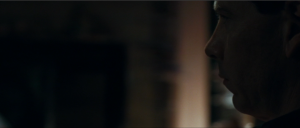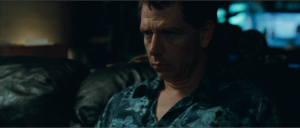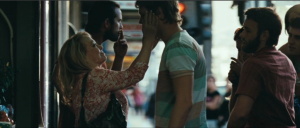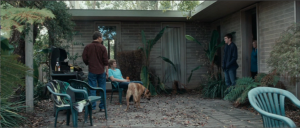Texto escrito originalmente em 2012. A análise discute em detalhes elementos da drama, incluindo spoilers.
To say that Animal Kingdom, David Michôd’s terrific debut feature film, is just another crime story is massively misleading. The achievement here is a thrilling yet slow-paced drama about family, loyalty, corruption and the last, but not least, about the fitting of species in their own environment.
Loosely based on “one of Australia’s most notorious – and unsolved – crimes”1, the Walsh Street shootings, Animal Kingdom follows the criminal Cody family, which bares similarities with the real and controversial Pettingill family, as it goes through one of its most crucial years during Melbourne’s late 80’s. At first, J (James Frencheville) is introduced in a static long shot in which he’s watching Deal or No Deal with his overdosed mother by his side. Soon the paramedics come and, without any sign of emotion, he tells them she had heroin. His first act is to call his grandmother, Smurf (Jackie Weaver), as he knows she’s the kind of woman who is “all over it” when needed.
Soon enough, J enters a world that his mother protected him from all his life. He moves into an alpha male house that resembles a bunker populated by Craig (Sullivan Stapleton), a drug addict who could be described as being “like watching a cyclone go through the place”2; Darren (Luke Ford), the youngest and most introspective of the brood; and “Pope” (Ben Mendelsohn), a dangerous and psychopath criminal who, along with Smurf, “runs” the family.
Everything begins to fall apart in their little claustrophobic world when Baz (Joel Edgerton), a friend and associate of them, is cold-blood executed by the all-means Victoria Police Armed Robbery Squad. In an ill-considered act of revenge, the brothers decide to execute two random cops in an ambush, starting a two years prosecution that, in the real-life event, cost $30 million to the public treasure.
The story unfolds as the family tries to survive amid the chaos that falls upon them. However, their worst enemy is not the law authority, but themselves, as their strong personalities begin to crash with each other. From trying to survive to a potential dangerous criminal, J is molded by his environment in an inevitable path. Indeed, David Michôd’s script has arguably a lot a characteristics form the Naturalism Literature, as it is strongly influenced by Determinism, which is “basically the opposite of the notion of free will. For determinism, the idea that individual characters have a direct influence on the course of their lives is supplanted by a focus on nature or fate” 3. Other influence of the style on the writing was the predominance of pessimism. The world is an unchangeable dark place where the society rules can get into. “Naturalistic works exposed the dark harshness of life, including poverty, racism, violence, prejudice, disease, corruption, prostitution, and filth” 3.
The newcomer James Frencheville, whose performance may seem wooden at first sight, creates a character that never really shows any feelings and thoughts, but experiences an unarguable growing throughout the story, shown by little choices that may pass unnoticed. His body language alone tells how mature he became in the end of the film, when he returns from a self-imposed isolation after the trials are over. According to the director, this was the hardest role to find, as the actor was chosen among more than 500 other youngsters. In an interview, David Michôd recollects how, even tough he thought James was the best choice, because he was the only one giving ideas to the composition, it was hard to decide once that, in his mind, J should be a much smaller and weaker kid. With time he realized how it would be good for the film if J actually looked like a grown up man, making his dilemma of figuring out where he fits much more urgent, since people would expect him to behave properly to his appearance, even tough he is still a kid.
This particular casting was even more critical considering the fact that the seventeen years old is the center of the narrative, and it’s imperative that his inevitable climb to this corrupted world is credible. A hard thing to do, considering that his past is never unfolded properly, only by short moments such as in the restaurant’s toilet, in the conversation with Baz – These things never see me. I’m invisible – or by the fact that he already knows how to steal a car. One could arguably say that his childhood was something like the main character in David Michôd’s short film Crossbow (2008), a film that resembles Animal Kingdom in mood and setting. This argument is stronger considering the fact that J is loosely based on real life criminal Jason Ryan who, in his teen years, had an incident in front of his uncle’s house with a crossbow pointed to a truck driver.
Joel Edgerton, currently one of the most prominent Australian actors and David Michôd’s associate in Blue-Tongue Films, gives to Baz a warmth and respect that makes it easy to understand why that family held together for so long, even tough he’s not blood related. His performance earned him the AFI award, despite his short time on screen. Guy Pearce, as detective Nathan Leckie, is the only key for J’s redemption, and his seriousness and dignity are solid in his behavior among the crooked cops. He is very human and his frustration is palpable when he fails to persuade J. Possibly he was the only person who really cared about his star-witness, even tough it’s never really clear if his fatherly approach towards the boy is of real care or just duty. ”Crime is always intriguing,” Guy Pearce says, ”but something like a planned assassination of the cops is so provocative, and knowing similar scenarios had actually happened in the city I was living in made it highly charged … emotional, scary, strange and just kind of unbelievable really.” 4
As for the family in question, Luke Ford and Sullivan Stapleton deliver great composition of characters, but it is really the frightening characters of Ben Mendelsohn and Jackie Weaver, the latter Academy Award Nominee for Best Supporting Actress, that triggers the biggest thrilling impression. ”It’s such a cloistered family,” Mendelsohn says. ”They’re so tight it’s almost unbearable in a lot of ways. They’re so ruled over by the Smurf character and the Pope character. You just want to find a way of making that very unsettling but also very plausible.” 4
Weaver, in an obvious reference to the real-life “Granny Evil” Kathy Pettingill, is a real lioness disguised as hyena walking among her sons. She was the first actress attached to the project, according to Michôd, because she had the qualities of “a delightful, almost ingenious naivety” that he wished for the character. An ethic woman by her codes and morals, she is loyal to her family until it’s necessary to protect her owns, and it’s just mesmerizing when, almost at the end of the film, she shows her true and cruel side, ordering the murder of her grandson and, in a few scenes later, treating him with love and care as he “comes back” to her side. Jackie Weaver manages to portrait this character always with the sweetest smile and voice, which just makes her even scarier. Her relationship with her grow-up children is a disturbing case of Oedipus complex, treating them as little kids and giving them kisses that last a bit too long to be normal.
On the other side, also loosely based on a real person, this time Kathy Pettingill’s first born, Dennis Allen, Ben Mendelsohn creates the biggest threat for J and the family’s welfare. His cold gaze, often even somehow autistic, his troubled mind and his ill-considered acts are the most thrilling and unnerving aspect of the film. Often it’s not what he’s done that is scary, but what it’s known he could do. Different from what one would expect from a character like this, Mendelsohn rarely raises his voice, all his outbursts are controlled and when he takes action, it’s deadly and decisive. He is the mean kind of man who never says what he’s truly planning, playing tricky mind games to watch his surroundings’ reactions. “I was simply placing the actors into characters that embodied their natural qualities.” David Michôd says Pope is a ‘confusing’ kind of character, very contradictory, capable of charm, but also cunning. “And Ben is like that too, very sharp.” 5
His monstrosity comes to its peak in a brutal murderer of J’s girlfriend, which even gives him an actual hard on. Dennis Allen, also known as Mr. Death, was one of the most feared criminals in Australia’s history, being directly responsible for the bad name the Pettingills still have. His mother once said “He had periods of being above the law. He thought he was invisible, he could do anything he wanted and nobody could challenge him. Then somedays he’d be back to reality and ask what he’d done.’’ Also, related to the Walsh Street trial, Kathy Pettingill would say “we’re still paying for his sins. We all are.” 6 And that’s exactly what happens, everyone in Pope’s way suffers the consequences of his misdeeds, directly and indirectly.
Ben Mendelsohn recollects that their preparation was all about hanging around together, getting to know each other. “Got into a point where it was confortable enough for us to all start firing to each other”. “Well, they were never out of character, those boys” Weaver says, “getting to the point it gets a bit unruly”. They remember that not every step of the way was smooth. Their proximity sometimes during the shooting leaded them into fights. At one point, Luke Ford and Ben Mendelsohn wouldn’t talk to each other anymore, as Mendelsohn would pick on Ford off camera. However, this real tension was the ingredient for scenes such as the kitchen with Pope and Darryl, when the first is questioning his brother’s manhood. “It was so interesting for me, even early on when I casted these boys and got them in for rehearsal, I feel like, even when these guys were just fooling around with one another, you could see that the whole thing worked”, according to Michôd.
”There was something about that one event – the Walsh Street shootings – that has a confronting emotional power,” Michôd says. ”It’s actually quite harrowing to think of cops – especially young cops – being gunned down randomly as a result of larger tensions with which they had no involvement … I wanted to build a big story and I wanted an event of that nature to sit at the centre of it.” 4 There is a big conflict inside the film that is the clash between Pope and J over the control of that jungle they live in. J bares similarities with Mendelsohn’s character, as both of them clearly have psychopathic tendencies, shown by their virtual lack of real emotion before death. One could arguably say that Pope had a childhood alike J’s, while J might have a future alike Pope’s. Both are extremely lonely people. It is a fight J was dragged into. He must act to survive, no other way around it. There are two shots in key moments that suggest this rivalry between them:
These two tracking shots position both in opposite sides of the frame, and the two scenes are related to Laura Wheelwright’s Nicky Henry. The likeness of the camera movement might suggest that they bare more similarities than it seems, surely more than J would like to. A reference to Taxi Driver (1976) could be seen in Pope’s shot because of the soundtrack choice, something that highlights their loneliness.
As this example proves, it’s not only cast related that Michôd’s talent shows clearly. His mise-en-scène is apparent throughout Animal Kingdom, with arguably Michael Mann’s influence, as commented in the director’s interview for SBS Film. Along with Adam Arkapaw’s cinematography – his feature debut as well – and Jo Ford’s production design, he creates a claustrophobic mood that sets an unpleasant feeling of hopelessness for those characters and the world they live in. The camera is usually observational, handheld in some tense scenes. Antony Partos’ soundtrack is equally necessary to set this slow burning effect of growing despair.
The house they live in, for example, resembles a bunker; its windows are usually overexposed and its 70’s architecture brings an oppressive feeling into it. It was an extensive location scout for the perfect place and, once found, the director recollects that “it was one of those houses where I just walked in and suddenly I could see all of the scenes of the movie. (…) I always wanted this house to feel like a dark cave where bad things happen”. “My thing with doing Australian drama, whether I got budget or not, is if the audience is looking at the actors performing their parts in the film and never once remember anything about the background, good” Jo Ford states. Liz Watts, the producer, tells how the project always was “always coming back to character, coming back to story and drama, and not going into visual styles for the sake of it”.
The whole movie was shot in location and one particular choice was the field where Craig is shot dead. Its openness resembles a Discovery Channel documentary of the wild live, where the prey is running away from its predator. The flies that soon take over his body fit a poetic metaphor for the film’s title. The physical violence is rare, but when it comes to scene, it’s powerful. Every gun fired has strength of its own and no life is cheap, neither taken for granted.
Another interesting point of Michôd’s work with his camera is the way the character’s relationships are portrait. It’s clear by his interviews the importance given to these relations, and his framing shows that concern. Smurf and her sons are always shown in the beginning close to each other, but as their lives deteriorate, they grow further apart until, after Pope and Darren’s arrest, they aren’t shown together anymore, always isolated from each other by a screen. The reflection of the lions of the initial credits on the glass in one of the last shots of the film is a strong summary of the whole movie and what it was all about, as J takes the place that once belonged to Pope.
Other minimalist moment created “by chance”, as it is said in the director’s commentary, is in one of the slow-motion scenes. “There’s something very beautiful about slow-mo,” he says. “It’s used in moments that become like out of body experiences for J.” 6 When Frencheville’s character decides to turn himself in to the witness protection program, the place Leckie and him decide to meet is at a market shop. In the frame, there is a little girl just happy to be there, twisting around herself with her family. When the detective sits next to J, the vision of the girl is blocked. This arguably shows how that’d be the life J should have, a normal family buying some groceries at the neighborhood market, not talking about murder and running for his life. However, the law will never leave him or his relatives alone. That’s the kind of life his blood deprived him of.
Luke Doolan’s editing work (he also plays the corrupted cop Roache) shows up in one of the main scenes of the film, when Guy Pearce “explains” the title, Animal Kingdom. At first, the characters are far apart and, as the camera zooms in, the shots get tighter and the distance between them decreases, until the detective’s presence dominates the frame, as his speech gets into J’s mind. Michôd explains how good it was to film this piece of scene, because it was one page a half of monologue, an idea that could easily become too obvious and boring. But watching an actor like Guy Pearce delivering the lines so well was relieving. After the trial, when Nathan Leckie clearly knows he lost the battle for J’s soul, it’s J who dominates the frame, being bigger than life, squeezing Leckie in the frame.
And as in Michael Mann’s masterpiece, Heat (1995), David Michôd carries his narrative with so much security that he allows moments to know supporting characters better and to contemplate the effects caused by the character’s decisions, something that is often rare in a film where the action is expected. Nicky’s death and her family grief is so powerful because of short scenes in which she interacts with her mother, even tough it’s not essential for the story. As well for the two young police murdered or the personal life of detective Nathan Leckie.
Also Michôd summarizes pieces of the plot with visual instead of dialogue, such as the aftermath of the trial, when all the rage of the police squad is condensed in a brief lose of work ethic by a cop who points a gun to J (it’s reported that the message “The verdict in the Walsh Street trial was all four not guilty, repeat, not guilty. All units are warned, keep yourselves in control” was sent across all police radio channels 6).
The initial credits are another example of visual storytelling, as the intercut of the animal kingdom picture to the bank robbery photographs sets the mood and setting of the film. David Michôd says that was a decision taken in the editing room, after a few screening tests in which people were taking too long to understand the kind of people the Cody’s were.
The aftermath of the film’s release was a loud critic’s acclamation. It was screened in the Sundance Film Festival and won drama prize. ”Ten years of having an idea and wanting to bring it to fruition and never quite knowing whether or not you’re getting it right, to have that end with a juror basically describing the film as you’d always hoped it would be described was overwhelming,” Michôd says 4. The Porchlight Films’ production, shot with an estimated budget of $5 million in a period of seven weeks, was the third Australian film highest gross of the year, earning almost $4 million and a half, and almost $6.7 million worldwide.7
Although it was a flop in the USA, it was praised by its critics, earning a 97% approval in the website Rotten Tomatoes. “The critical consensus is: “With confident pacing, a smart script, and a top-notch cast, Animal Kingdom represents the best the Australian film industry has to offer.” 7 The Empire Online said “Animal Kingdom is that rarity: a gangster movie that — imagine this — makes you wish there were more of them.” 8; the critic of NY Times stated “The film’s depiction of the raw fear lurking below the brothers’ braggadocio is the most pronounced emotion in a movie whose focus on the personalities of its criminals suggests an Australian answer to “Goodfellas,” minus the wise-guy humor”9, and Roger Ebert said that “Rather than typical flashy crime actions we usually expect from this genre, his gritty noir tale is mainly fueled by the characters and the intense moments between them”. ”I wanted to make as big an impact as I could with a first movie,” Michôd says. ”By dabbling in the world of crime, you’re already walking a well-trodden path. I knew that I wanted to make this movie feel unusual and I wanted it to have the capacity to excite people – to excite critics and audiences – because I wanted it to stand out from the crowd.” 4
For the actors’ careers, it was a huge boast. All main cast are involved in the production of other big films in Australia and USA. From them, the two that are perhaps most notorious are Joel Edgerton, who stars in films with other stars such as Leonardo DiCaprio in Baz Luhrmann’s The Great Gatsby and is currently shooting the next Kathryn Bigelow’s project; and Jackie Weaver, Academy Award Nominee, who is in Judd Appatow’s production comedy 5 Years Engagement and Chan-wook Park’s Stroker, with Nicole Kidman10. ”It’s great [so many Australian actors are thriving in the US]. No one seems to take the industry seriously over here. They think it’s some frivolous hobby … We regard the performance industry with suspicion.”11 Weaver says.
As for the director, he is currently developing a new project called The Rover with Liz Watts and Porchlight with an estimated $12.5 million budget12. David Michôd’s company, Blue-Tongue Films, has been a prominent production company in Australia, having released since then two critically acclaimed feature films directed by his associates and founders of Blue-Tongue: Hesher (2010), directed by Spencer Susser and co-written by David Michôd; and Wish You Were Here (2012), directed by Kieran Darcy-Smith (he is the HR officer during the first J’s interview in Animal Kingdom, whose only line was cut-off in the editing room).
Both of these films were surprising debut features as well that were also screened in Sundance, earning great critic’s reviews throughout festivals worldwide. Just like Guy Pearce’s character asks J in the end of Animal Kingdom, “Have you worked out where you fit?”, the members of this talented group from Blue-Tongue Films also worked out where they belong in the movie industry and hopefully they will continue there delivering amazing films like this one.
References:
1 Noble, T. (1991) ‘Walsh St’ Victory Books
2 Sewell, S. (2010) ‘Animal Kingdom – A Crime Story.’ Victory Books
3 Williams, Raymond. 1976. Keywords: A Vocabulary of Culture and Society. London: Fontana, 1988.
4 Sydney Morning Herald
http://www.smh.com.au/entertainment/movies/killer-crims-take-sundance-by-storm-20100514-v3ls.html Accessed: June, 2012
5 Galvin, P. (2010)
http://www.sbs.com.au/films/movie-news/320797/King-of-the-jungle Accessed: June 2012
6 Tame, A. (1996). ‘The Matriarch – The Kathy Pettingill Story.’ Macmillan, Vol. 1
7 Wikipedia
http://en.wikipedia.org/wiki/Animal_Kingdom_%28film%29 Accessed: June 2012
8 Wise, D. (2012)
http://www.empireonline.com/reviews/reviewcomplete.asp?FID=137114 Accessed: June 2012.
9 Holden, S. (2010) http://movies.nytimes.com/2010/08/13/movies/13animal.html Accessed: June 2012
10 International Movie Database
www.imdb.com Accessed: June 2012
11 Power, L. (2012)
http://www.brisbanetimes.com.au/entertainment/movies/jackis-long-engagement-20120427-1xpjy.html#ixzz1xS6NPy60 Accessed: June 2012
12 Screenhub
http://www.screenhub.com.au Accessed: June 2012
Films Mentioned:
Crossbow (2008) – Dir. David Michôd
Taxi Driver (1976) – Dir. Martin Scorsese
Heat (1995) – Dir. Michael Mann






















